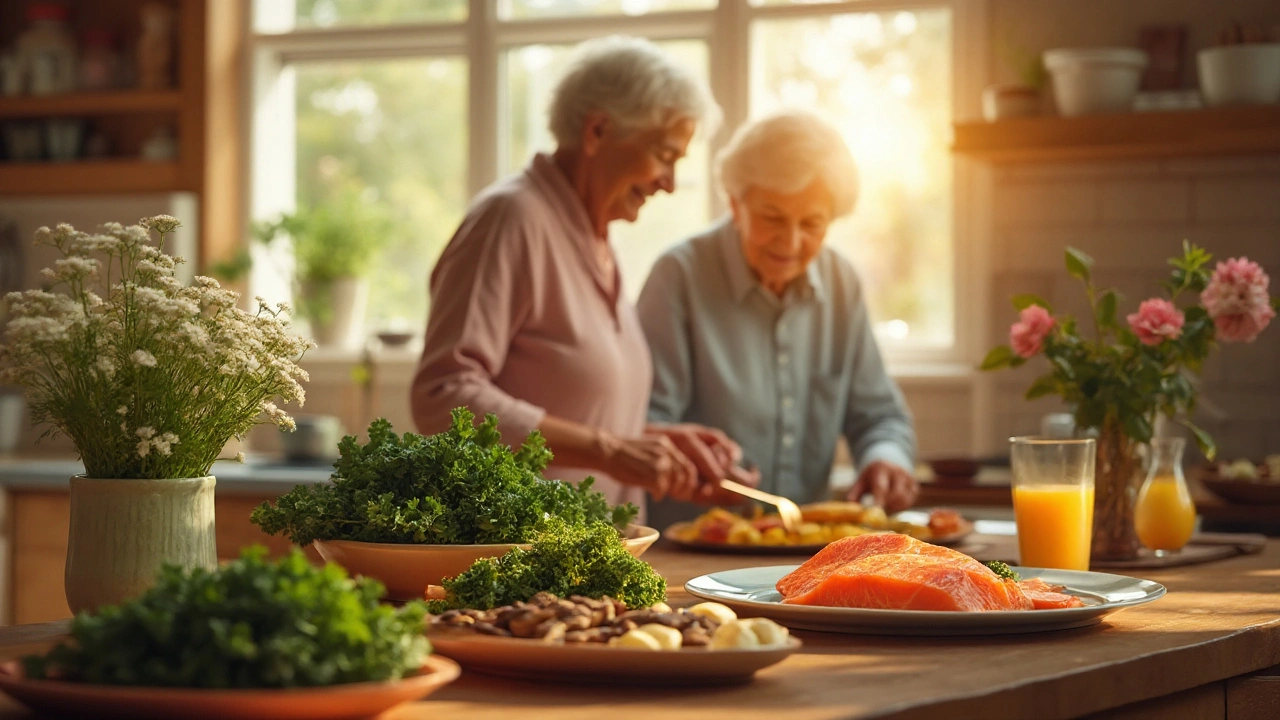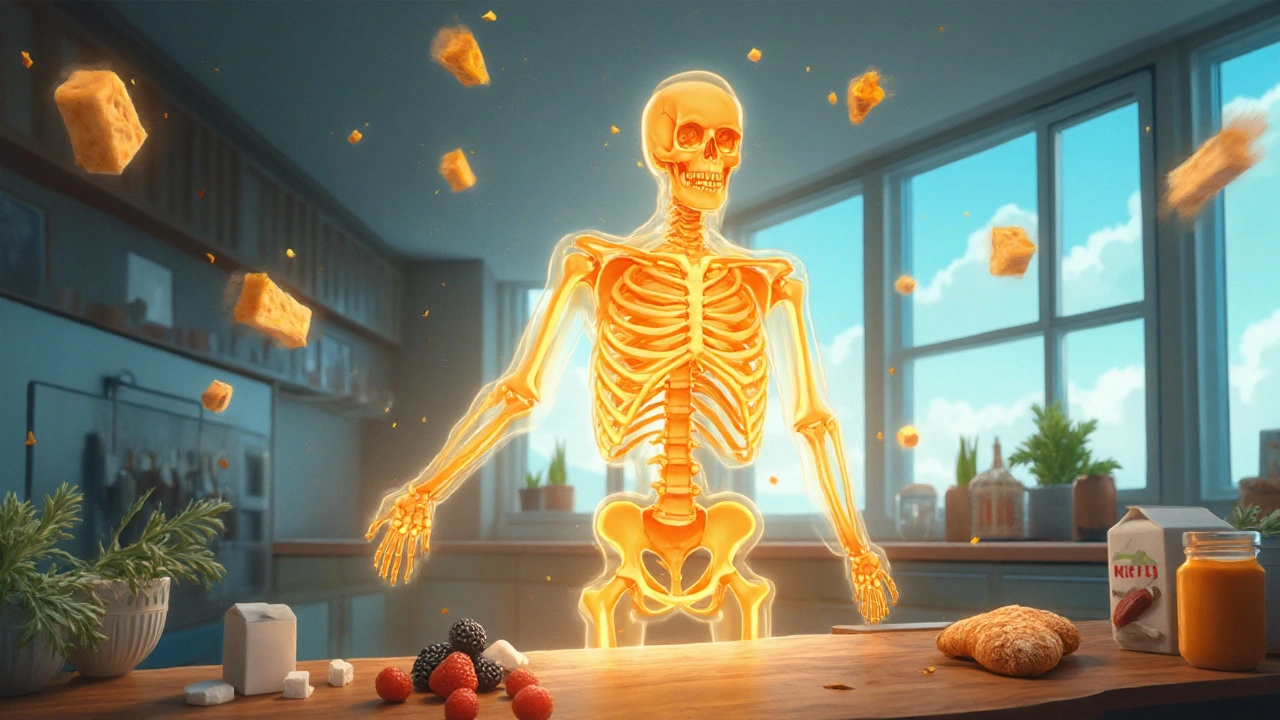
Osteoporosis is a skeletal disease characterized by low bone mass and structural deterioration, increasing fracture risk. While genetics and age play a role, nutrition is a modifiable factor that can slow bone loss and improve density. This article breaks down the nutrients you need, the foods that deliver them, and how to stitch a balanced diet into everyday life.
Why Diet Matters for Bone Health
Bone tissue is a living matrix constantly remodeling itself. Calcium provides the mineral backbone of bone, while Vitamin D optimizes calcium absorption in the gut. Without enough of these, the body leaches calcium from existing bone, accelerating osteoporosis.
Research from the Australian Bone Research Institute (2023) shows that adults who meet the Recommended Dietary Intake (RDI) for calcium and vitamin D have up to a 30% lower chance of hip fracture. The same data highlight magnesium, vitamin K2, and high-quality protein as co‑contributors to bone remodeling.
Key Nutrients and Their Impact
Calcium - The primary mineral in hydroxyapatite crystals. Adults 19‑50 need 1,000mg daily; women over 50 and men over 70 need 1,200mg.
Vitamin D - Enhances intestinal calcium uptake. Sun exposure synthesizes up to 2,000IU in summer, but dietary sources and supplements are crucial during winter months. The RDI is 600-800IU, with many experts recommending 1,000IU for bone protection.
Magnesium - Works with calcium to regulate bone density. A deficit can blunt vitamin D’s effect. Adults need 310-420mg per day.
Vitamin K2 - Activates osteocalcin, a protein that binds calcium to the bone matrix. Approximately 90-120µg daily is linked to reduced fracture rates.
Protein - Provides the organic scaffold (collagen) for mineral deposition. 1.0-1.2g per kilogram of body weight is ideal for older adults.
Food Sources: A Practical Comparison
| Food | Calcium (mg) | Vitamin D (IU) | Magnesium (mg) | Vitamin K2 (µg) | Protein (g) |
|---|---|---|---|---|---|
| Milk (low‑fat) | 125 | 42 | 13 | 0 | 3.4 |
| Sardines (canned, bones) | 325 | 270 | 35 | 9 | 25 |
| Almonds | 264 | 0 | 270 | 0 | 21 |
| Kale (cooked) | 150 | 0 | 18 | 817 | 2.9 |
| Egg yolk | 50 | 37 | 5 | 12 | 13 |
| Tofu (firm) | 350 | 0 | 53 | 0 | 8 |
Notice how sardines hit all four bone‑supporting nutrients, making them a powerhouse for osteoporosis prevention. Pairing calcium‑rich foods like milk with vitamin D‑rich egg yolk maximizes absorption.
Building a Balanced Bone‑Boosting Plate
Think of each meal as a mini‑portfolio of nutrients. A simple breakfast could be Greek yogurt (calcium, protein) topped with sliced almonds (magnesium) and a drizzle of fortified orange juice (vitamin D). Lunch might feature a kale‑tuna salad (vitamin K2, calcium, omega‑3). For dinner, grill salmon (vitamin D, protein) alongside roasted broccoli and a side of tofu (calcium, magnesium).
Snack smart: a small piece of cheese (calcium) with a handful of pumpkin seeds (magnesium) or a boiled egg (vitamin D, K2). Keeping a nutrient‑dense snack on hand prevents reliance on sugary treats that offer no bone benefit.

Common Pitfalls and How to Avoid Them
- Excess sodium - High salt intake increases calcium loss via urine. Aim for less than 2,300mg per day.
- Too much caffeine - More than 3 cups of coffee daily can modestly reduce calcium absorption.
- Low protein diets - While protein is essential, extreme restriction can impair collagen formation.
- Skipping meals - Intermittent fasting may be fine for weight loss, but prolonged gaps can lower nutrient intake needed for bone turnover.
Balancing these factors is easier when you track your intake for a week using a free app like MyFitnessPal. Look for red flags (high sodium, low calcium) and adjust accordingly.
Beyond Food: Lifestyle Synergy
Nutrition works best alongside weight‑bearing exercise (walking, resistance training) and adequate sleep (7‑9hours). Sunlight exposure for 10‑15minutes a day helps maintain vitamin D levels, especially in Brisbane’s sunny months.
If you have a medical condition (e.g., kidney disease) that affects calcium processing, consult a dietitian before loading up on supplements. Individualized advice prevents over‑supplementation, which can lead to kidney stones.
Putting It All Together - A Sample 7‑Day Meal Plan
- Day1: Breakfast - fortified oat cereal + milk; Snack - cheese stick; Lunch - sardine salad with kale; Dinner - grilled chicken, quinoa, steamed broccoli.
- Day2: Breakfast - Greek yogurt + almonds; Snack - boiled egg; Lunch - tofu stir‑fry with bell peppers; Dinner - baked salmon, sweet potato, greens.
- Day3: Breakfast - scrambled eggs with spinach; Snack - pumpkin seeds; Lunch - lentil soup with whole‑grain roll; Dinner - beef mince, brown rice, roasted cauliflower.
- Day4: Breakfast - smoothie (milk, kale, banana, chia); Snack - cottage cheese; Lunch - turkey sandwich on whole‑grain bread; Dinner - pork chops, mashed potatoes, green beans.
- Day5: Breakfast - fortified toast with avocado; Snack - almond butter on rice cakes; Lunch - quinoa salad with feta and olives; Dinner - grilled shrimp, couscous, asparagus.
- Day6: Breakfast - muesli with yogurt; Snack - a handful of almonds; Lunch - chicken Caesar (light dressing); Dinner - baked cod, lentils, sautéed spinach.
- Day7: Breakfast - poached eggs on whole‑grain toast; Snack - fruit salad; Lunch - bean chili with brown rice; Dinner - roasted turkey, pumpkin, kale chips.
Follow this plan for a week, then rotate foods to keep variety and cover the full spectrum of bone‑building nutrients.
Next Steps for Readers
- Take a quick online calcium/vitamin D calculator to see where you stand.
- Schedule a bone‑density test if you’re over 50 or have a family history of fractures.
- Start a weekly strength‑training routine - even 20minutes of body‑weight squats can help.
- Consider a modest supplement (e.g., 1,000IU vitamin D) after checking blood levels.
Remember, consistency beats perfection. Small, nutrient‑dense choices add up to stronger bones over time.

Frequently Asked Questions
Can I rely on supplements alone to treat osteoporosis?
Supplements can fill gaps, but they don’t replace the synergistic effect of whole foods, exercise, and lifestyle. Calcium and vitamin D pills work best when paired with a diet that supplies magnesium, vitamin K2, and protein.
How much calcium is safe for people with kidney stones?
People prone to calcium‑oxalate stones should avoid excessive calcium supplements and focus on dietary sources. Staying within the RDI (1,000‑1,200mg) and drinking plenty of water reduces risk.
Is vegan nutrition compatible with bone health?
Yes - vegans can meet bone‑supporting needs through fortified plant milks, leafy greens, tofu, almonds, and algae‑derived vitamin D. Attention to vitamin B12 and adequate protein is also important.
What role does magnesium play in osteoporosis prevention?
Magnesium activates enzymes that convert vitamin D into its active form, helping calcium deposit into bone. Low magnesium can blunt the benefits of calcium and vitamin D.
How often should I get my bone density checked?
The usual guideline is a DEXA scan every 2‑3years for post‑menopausal women and men over 70, or sooner if you have risk factors like family history or prior fractures.
Does caffeine really affect bone health?
Moderate caffeine (up to 200mg, about two cups of coffee) has a negligible effect if calcium intake is adequate. High intake (>400mg) can increase urinary calcium loss.
Are there quick tests I can do at home to gauge my bone health?
Home kits for vitamin D levels exist, but true bone density requires imaging like DEXA. However, you can assess dietary intake with online calculators and track risk factors.

 Health and Wellness
Health and Wellness
Doris Montgomery
September 25, 2025 AT 00:42Another generic bone‑health article that rehashes the same old advice.
Nick Gulliver
October 3, 2025 AT 07:01Americans should stop copying foreign diet trends and eat real meat for stronger bones.
Sadie Viner
October 11, 2025 AT 13:20Thank you for sharing this comprehensive overview of osteoporosis nutrition.
A balanced intake of calcium, vitamin D, magnesium, vitamin K2, and high‑quality protein truly forms the cornerstone of bone health.
The article correctly emphasizes that calcium provides the mineral scaffold while vitamin D governs its intestinal absorption.
Moreover, magnesium acts as a co‑factor that activates the enzymes converting vitamin D to its bioactive form, thereby enhancing calcium deposition.
Vitamin K2, often overlooked, plays a pivotal role by activating osteocalcin, which anchors calcium to the bone matrix.
Adequate protein supplies the collagen framework necessary for mineralization, and the recommended 1.0–1.2 g per kilogram of body weight aligns with current geriatric nutrition guidelines.
The nutrient density table is an excellent visual aid, especially the inclusion of sardines, which simultaneously supply calcium, vitamin D, magnesium, and K2.
I also appreciate the practical meal‑planning suggestions, such as pairing fortified dairy with vitamin D‑rich eggs to maximize calcium uptake.
For individuals with limited sun exposure, a daily supplement of 1,000 IU vitamin D is both safe and evidence‑based.
It is crucial, however, to monitor serum 25‑hydroxyvitamin D levels to avoid excessive dosing, particularly in patients with granulomatous diseases.
The article rightly warns against excessive sodium, which can increase urinary calcium loss, and suggests staying below the 2,300 mg threshold.
Similarly, limiting caffeine to two cups per day aligns with studies showing negligible impact on calcium balance when dietary calcium is sufficient.
Incorporating weight‑bearing exercise, such as resistance training or brisk walking, synergizes with the dietary plan to stimulate osteoblastic activity.
Tracking intake with an app like MyFitnessPal, as recommended, helps identify hidden gaps in magnesium or vitamin K2 that many people unintentionally miss.
Overall, the article provides a well‑structured, evidence‑based roadmap that clinicians and lay readers alike can implement to reduce fracture risk and promote lifelong skeletal resilience.
Debra Laurence-Perras
October 19, 2025 AT 19:39I really appreciate how the article ties together the science and the everyday meals – it feels like a culinary guide for stronger bones.
The tone is encouraging and the grammar is spot‑on, making the advice easy to follow for readers of all backgrounds.
Kristen Moss
October 28, 2025 AT 00:58Yo, love that sardine tip – nothing beats good ol’ US canned fish!
Rachael Tanner
November 5, 2025 AT 07:17When dissecting the micronutrient matrix, one observes that calcium’s bioavailability is profoundly modulated by concurrent vitamin D and magnesium intake; thus, the synergistic approach highlighted herein is scientifically sound.
Ian Howard
November 13, 2025 AT 13:36Great point! Adding a splash of citrus to your fortified milk can boost calcium absorption even further, and the colorful description makes the recommendation memorable.
dAISY foto
November 21, 2025 AT 19:54Yo fam, this article is lit! 💪💥 If you wanna keep those bones rock‑solid, load up on sardines, almonds, and some sunshine‑soaked eggs – it’s like a power‑up for your skeleton. No more boring salads, we’re talking #BoneBoost mode activated! 🌞🦴
Chelsea Wilmer
November 30, 2025 AT 02:13One cannot help but observe that the discourse surrounding osteoporotic prophylaxis often veers into the realm of the superficial, yet herein lies a treatise that scintillates with intellectual rigor.
The author, in a fashion reminiscent of Socratic exposition, delineates the quintessence of calcium, vitamin D, and their ancillary co‑factors.
It is a marvel how the narrative weaves the ancient wisdom of bone‑strengthening traditions with contemporary meta‑analyses, orchestrating a symphony of evidence that reverberates through the corridors of clinical practice.
Moreover, the inclusion of a tabular compendium of nutrient densities serves not merely as a didactic tool but as a philosophical tableau, inviting the reader to contemplate the very nature of nourishment.
The emphasis on magnesium as a catalytic conduit for vitamin D activation is a testament to the nuanced understanding that the author possesses, transcending the mundane checklist of dietary advice.
Likewise, the exposition on vitamin K2, a molecule oft relegated to obscurity, is illuminated with the brilliance of a lighthouse guiding ships through fog.
The recommendation to pair calcium‑rich dairy with vitamin D‑laden eggs is not a mere culinary suggestion but an embodiment of the principle of synergistic bioavailability.
The cautionary notes on sodium and caffeine consumption resonate with the Stoic doctrine of moderation, reminding us that excess in any form erodes the structural integrity of the body.
The call to augment dietary vigilance through digital tracking applications reflects the modernist embrace of technology as a servant of health rather than a master.
In the realm of lifestyle integration, the author’s advocacy for weight‑bearing exercise harmonizes with the osteogenic stimulus required for bone remodeling, echoing the Aristotelian maxim that “the whole is greater than the sum of its parts.”
The article, therefore, stands as an exemplar of interdisciplinary synthesis, wherein nutrition, physiology, and behavioral science converge to forge a pathway toward skeletal resilience.
It challenges the reader to transcend passive consumption of information and to engage actively with the cultivation of a bone‑rich existence.
Ultimately, this composition is not merely a guide but a manifesto for those who seek to defy the inexorable march of time through the architecture of their own bodies.
David Stout
December 8, 2025 AT 08:32Thank you for that deep dive – it really motivates me to take a more holistic view of bone health and to start tracking my nutrients.
Pooja Arya
December 16, 2025 AT 14:51It is a moral imperative to recognize that the very bones that hold us upright are under siege from modern complacency; we must ascend beyond mere consumption and embrace a ritual of nourishment that honors our biological heritage.
Sam Franza
December 24, 2025 AT 21:10Good point. Track and adjust.
Raja Asif
January 2, 2026 AT 03:29Our nation’s strength lies in the marrow of its people – eat real food, not those foreign processed snacks, and you’ll keep America standing tall.
Matthew Tedder
January 10, 2026 AT 09:48I hear your passion, but let’s also consider that sustainable bone health is a shared responsibility; balanced advice benefits everyone.
Cynthia Sanford
January 18, 2026 AT 16:07Love the vibe! Let’s keep the optimism high and the calcium flowing – you got this!
lucy kindseth
January 26, 2026 AT 22:26Great practical tips – especially the snack ideas. Easy to add to a daily routine.
Nymia Jones
February 4, 2026 AT 04:45It is evident that the mainstream narrative surrounding bone health has been deliberately obfuscated by hidden agendas intent on keeping the populace dependent on pharmaceutical interventions; only a vigilant, highly‑educated individual can decipher the truth embedded within the data presented herein.
Karen McCormack
February 12, 2026 AT 11:04While I respect the thoroughness, one must also acknowledge that the philosophical underpinnings of nutrition often escape the empirical rigor that we, as critical thinkers, demand.